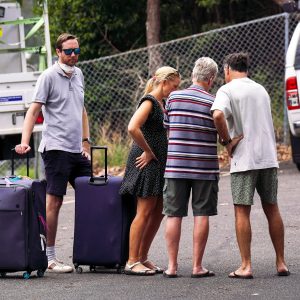Sudanese’s suffering continues as war enters 5th month
KHARTOUM, Sudan (AA) – The war between the army and the Rapid Support Forces (RSF) paramilitary group in Sudan is about to complete five months and there are no signs of ending.
There has been no cease-fire nor the opening of a humanitarian corridor.
Witnesses, medical sources, human rights activists and aid workers have reported that atrocities are ongoing in the war zones, including killing, looting and rape in the capital Khartoum as well as the states of Darfur and Kordofan.
Dozens of aid workers and human rights defenders have been killed or injured, and offices of the UN and other aid organizations have been looted in various areas.
Unstoppable displacement
When 45-year-old Abdul Azim Ahmed left his house in the Gabra neighborhood of southern Khartoum, he expected his journey to be over in a matter of days.
“On April 20, I took my small family and moved to the house of my extended family in the Kalakla neighborhood. However, clashes expanded to Kalakla within a few days, and in the middle of May, an airstrike pounded the neighborhood. Then I decided to leave Khartoum with my entire extended family and relocate to Aljazeera state,” Ahmed explained.
“We stayed in Medani city in Aljazeera for about two months, but the city has become very expensive in terms of renting, food, medicine, and the services of electricity, water, and the internet have deteriorated, so we found out that there is no reason to stay in Aljazeera.
“Then we decided to leave for our father’s village, Um Altyour, in the River Nile state, where we have been living for a month now,” he said.
Ahmed, who was an accountant at a private company, shared that he and hundreds of his colleagues have been fired from their jobs since the clashes began, because the private sector failed to pay its employees, exacerbating their suffering.
Famine looming
Food and other commodity prices have risen sharply in Sudanese Armed Forces-controlled areas outside Khartoum, owing to a lack of supply and shortages of fuel, electricity, water, and other necessities.
“Although we live in a more secure neighborhood of Althawra in Omdurman city, we can’t move outside our houses to bring the basic needs that we want,” a local Hussien Mohamed told the media.
“The majority of our neighbors have left their homes, and the situation is extremely frightening. The traders are also greedy enough to increase the prices because they want to exploit people’s needs and the lack of government monitoring,” Mohamed said.
Saeed Adel is an importer of wheat and other commodities from Egypt. “We sometimes also need to take different and longer routes to avoid insecure roads, which doubles the fuel consumption,” he added.
The situation comes amid widespread local and international concern about a looming famine in Sudan, as the harvest season is hampered by a lack of input materials and fuel.
The UN Food and Agriculture Organization (FAO) warned that half of Sudan’s population is facing an acute food shortage and is on the verge of famine.
“According to the latest Integrated Food Security Phase (IPC) projections, over 20.3 million people, representing more than 42 percent of the population in the country, are experiencing high levels of acute food insecurity (IPC Phase 3 or above) between July and September 2023,” FAO said in a recent report.
Hospitals
The closure of hospitals and attacks on health care facilities by the two warring parties have already resulted in medicine shortages and problems for patients, particularly those with chronic illnesses, according to sources in the country’s health authority.
“More than 40 out of 57 hospitals in Khartoum are still closed, and this has had an extremely bad effect on the already fragile health system,” a source said, speaking on condition of anonymity for security reasons.
People are dealing with another grim issue as a result of the war: where to bury their loved ones. According to reports, dozens of Sudanese have been forced to bury relatives inside their homes in Khartoum and Darfur states because they are unable to bury them in cemeteries due to the fighting.
Abdallah Alhassan was forced to bury his brother in their home in Omdurman’s Umbada neighborhood in August because the family was unable to take his body to the cemetery.
“My brother was killed when a bomb exploded in our house last week while we were sleeping. We tried with some of our neighbors to bury him in the cemetery, but the clashes that day in Omdurman were very intense, so we preferred to bury him inside the house, and we left the house to stay with our relatives in Atbara,” he said.









